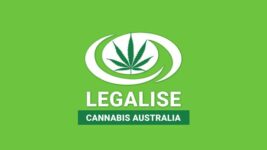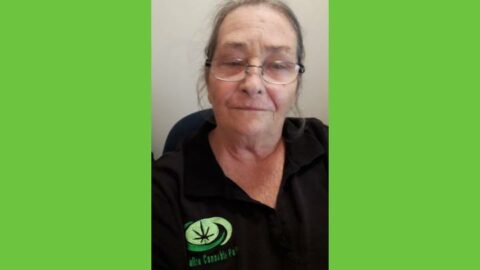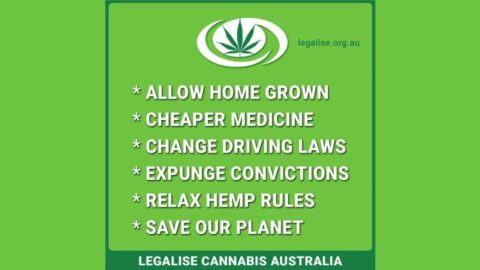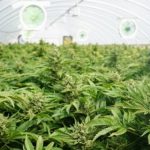Legislating Cannabis Legalisation: An Interview With Legalise Cannabis Candidate Gail Hester

When US Federal Bureau of Narcotics commissioner Harry Anslinger commenced his cannabis demonisation program in the 1930s, it was one of the most widely used medicines in Australia, with the first federal health director general having previously advised against any need for prohibition.
The job Anslinger did on cannabis was phenomenal. Here was a plant with far-reaching medicinal benefits, that when used recreationally was much less harmful than the more widely used and violence-inducing alcohol, and yet the bureau chief propagated the “reefer madness” myth.
These days, however, recreational cannabis is legalised in 18 US states, with most operating retail markets that generate tax revenue to the benefit of public health and education, whilst 37 American states have lawful medicinal cannabis that can be readily and affordably obtained.
With the Australian election looming, both majors are mute on this issue, and if pushed, they’re quick to recommit to the plant remaining illegal.
This is despite ACT Labor MLA Michael Pettersson having successfully seen recreational cannabis use legalised in the capital on 31 January 2020.
So, the Legalise Cannabis Australia Party is running Senate candidates in all states and territories this Saturday with the aim of getting the issue on the national agenda.
End cannabis prohibition
Established back in 1993, the Australian HEMP Party had been pushing for legalisation over the past three decades. However, last October, it decided to join forces with the rising number of state and territory Legalise Cannabis parties to form Legalise Cannabis Australia.
Legalise Cannabis Queensland was the first state party to run candidates in the October 2020 election. And the last Western Australia state election saw Legalise Cannabis WA take out two upper house seats at the March 2021 vote.
Legalise Cannabis wants to see a state-based licensing system established that allows for the legal cultivation, manufacture and retailing or dispensing of recreational cannabis, allowing for large and boutique producers, as well as homegrow and the inclusion of nonprofit cannabis social clubs.
Concerns around whether legalised cannabis use would be problematic for the wider community can be allayed by the consideration of its legal use in the capital territory over last two years, which has shown no demonstrable negative outcomes whatsoever.
Legal, yet unobtainable for some
Gail Hester is running on the Legalise Cannabis Australia NSW Senate ticket, alongside party president Michael Balderstone, in this weekend’s national vote.
Hester founded the Medical Cannabis Users Association (MCUA) back in 2014 to campaign for the legalisation of cannabis for medicinal use.
And while the Turnbull government did legalise medicinal use two years later, Hester is still advocating for greater access to more affordable cannabis medicines, as the way the system has developed, it’s easy for the wealthy to obtain, but near impossible for low-income patients.
Sydney Criminal Lawyers spoke to Legalise Cannabis Australia Senate candidate Gail Hester about the reasons why major party members are reluctant to champion the fairly innocuous substance, her preference for cannabis social clubs, and how the lawful medicinal market is currently operating.

Gail, you’re running as a NSW Senate candidate for Legalise Cannabis Australia. Broadly speaking, what sort of legalised cannabis model is your party looking to establish?
We want access to a safe, affordable and uninterrupted supply chain, with homegrow rights. And we want an industry that is inclusive of big and small producers.
We want cannabis re- or de-scheduled. Cannabis is not a poison. But it currently sits in schedules 3, 8 and 9 of the Poisons Standard (Cth).
It needs to come off schedule 9, which says it has no medical value and deems it a prohibited substance and enables arrests under the Drugs Misuse and Trafficking Act 1985 (NSW).
“Medical” cannabis could be managed by the TGA under the complimentary pathway. It’s not a pharmaceutical created in a lab. It’s a herbal medicine that has no need to be on two levels of the poison standard.
Personally, I like the idea of social clubs. They’re generally not-for-profit and offer a more cautious, public health-centred alternative to large-scale retail cannabis markets dominated by commercial enterprises.
There’s no reason why they could not be a component of the model we eventually settle on.
When it comes to writing a policy, I would like to see a summit with input from all stakeholders – users, producers, cultivators and retailers – and any agency formed, should be made up of these stakeholders, and not just government-appointed experts.
How does the model Legalise Cannabis is proposing differ from those already operating elsewhere?
It wouldn’t differ greatly to other models, but there would need to be some fine tuning of basic ideas.
We would like to see convictions for personal use crimes expunged: similar to most proposed models.
Drug driving laws need to be amended and penalties imposed based on impairment not just presence.
Random testing should be suspended until a proper method of measuring impairment can be found.
Alcohol tests have three levels of impairment: low range, midrange, and high range. We want similar testing for cannabis impairment.
And for patients not to have a defence against drug driving charges is ludicrous.
A lot of pollies hold up the Portugal system as a preferred model.
The majority of people who use cannabis socially, do it responsibly and don’t want or need to be rehabilitated. They want the freedom to use cannabis at will within reason.
Responsible use is what you aim for. Education, as they say, is the key.
Legalise Cannabis president Michael Balderstone launched this state’s campaign outside the office of his constituency’s lower house representative Nationals MP Kevin Hogan.
Hogan holds the seat of Page, which is the division likely to have the highest percentage of cannabis users in the nation.
Balderstone was making the point that as Hogan grew up locally and cannabis is so widely used, he obviously has no real problem with the plant, so why doesn’t he do something about legalising it in line with the want of the people he represents?
What do you think about the point Balderstone was making in this regard?
The point Michael is making is a valid one. Major party MPs and senators are expected to tow the party line and vote according to orders from the party machine on all issues.
They’ve lost touch with their constituents. Minor parties have more freedom to vote at will.
In saying that, using the example of the ACT, Hogan could have put a private members bill forward and acted independent of party policy.
I doubt it would have been successful though, due to the anti-cannabis stance of both majors, who don’t want to be seen as “soft on drugs”.
You’ve just touched on it there. But further, why do both the majors, besides ACT Labor, remain adamant about keeping recreational cannabis illegal?
Michael would say that the parties have been lied to for so long by Big Pharma and the police that they believe the bullshit. I would tend to agree with that.
Also, the major parties have political donors to appease, and legalising cannabis would impact negatively on their bottom line.
Big Tobacco, Big Pharma and Big Booze are three examples. It’s much like hemp was impacting on certain commercial bottom lines in the 1930s, before it was outlawed.
But of the two majors, Labor would be the one most likely to do it.
Another key issue about cannabis and hemp that’s often overlooked is its environmental properties and the variety of ways it can be used to the betterment of the planet.
The climate crisis has been escalating dramatically over recent years. So, can you talk about some of the key ways cannabis and hemp could be helping to prevent the heating planet and the degradation of the environment?
I don’t profess to be an expert on climate change or global warming but if what they say is correct about CO2 levels causing the planet to heat up, then hemp definitely has its seat at the environmental table for many reasons.
Hemp sequesters massive amounts of CO2 disproportionate to the size of the individual plant. Products made from hemp continue this sequestration process throughout their life and this makes it an essential part in the fight against climate change.
Houses built from hempcrete continue to absorb carbon dioxide as they cure. Imagine growing our public housing and combating climate change at the same time?
Hemp is increasingly being recognised as having great potential as a promising crop for bioplastics.
Hemp bioplastics break down very quickly and offer significant advantages for the environment and should be further developed.
Microplastics are another concern. More and more, microplastics are choking our air and waterways.
A textile industry using natural hemp fibre would markedly reduce the harm they’re doing and create jobs in manufacturing.
Unknown to many Australians, recreational cannabis use and personal possession has been legal in the ACT since January 2020. This is not a perfect model, as it leaves the supply side illegal.
But what do you think it tells us about cannabis use in general, when, in the jurisdiction where the federal government sits, people can freely partake of the substance without fear of criminal repercussions?
Many think Canberra is where all the politicians live, hence the quasi-legalisation to protect their children from negative and needless interactions with police. This is not so, as more public servants reside in the nation’s capital, than politicians.
Cannabis is not technically “legal” in the ACT. They made amendments to the law to allow for personal use and cultivation on a very small scale.
But, what the experience in the ACT has and is showing, is that cannabis legalisation will not cause the sky to fall in.
This has been like a small-scale trial and lawmakers should take a good look at the results of that trial, as well as public opinion.
There were dire warnings about cannabis being a “gateway to harder drugs” from minister Hunt. But in Canberra, a wastewater drug monitoring report by the Australian Criminal Intelligence Commission showed fewer more harmful substances were used last year.
Unlike the dire warnings from minister Hunt about “further health harms and exacerbated mental health issues”, ACT Health data shows there has been no increase in hospital presentations since the laws passed.
Concerns were expressed about more drug drivers, but drug driving offences have remained steady.
The federal government could legalise and allow all the states and territories to enact their own laws, similar to Canada, instead of continuing with the current unsuccessful regime of prohibition and criminalising otherwise law-abiding citizens.
There are over 1,000 arrests weekly for cannabis offences, but more than 50 percent of the adult population agree cannabis should be legalised.
In 2014, you founded the Medical Cannabis Users Association. Two years later, the Turnbull government legalised medicinal cannabis use and set up a framework to establish a legal supply chain.
This system has been widely criticised by cannabis law reformists. Although there have also been reports recently about it functioning much better these days, than it was for quiet some years.
In your understanding, how is the medicinal cannabis system working today?
The system works well if you have a well-paid job and anxiety, sleeping problems, or some kind of “pain” for which you use street cannabis.
The system sucks if you are disabled by your condition and on Centrelink benefits or low income.
It’s unfair. It’s discriminatory and too many patients are missing out due to the prohibitive cost of products.
I lose count of the comments I see from patients who either can’t initiate or maintain treatment due to cost.
One man, commented recently in the group:
“I have a large malformation on my brain causing all sorts of seizures and after giving up on a number epilepsy medication, I found cannabis works.
After waiting two years due to the backlog in the public system… the neurologist could not write me a script because the dose I need would put me in financial hardship, regardless of the benefits it clearly shows it has for me.”
But, if you can afford it, you can make a telehealth appointment, with a “plant medicine specialist”, pay a consultation fee – of anything up to $450 – and you will get your medicine sent to you or the pharmacy once it’s approved by a bureaucrat.
Specialist “plant medicine clinics” were a very clever marketing idea and were the answer to products languishing on warehouse shelves because doctors refused to prescribe them.
So, in their own way, they have made the system “work” for some.
So, does that mean people who use cannabis medicinally can now easily obtain effective products?
Yes, some can. The system has been streamlined. The clinics are popping up everywhere. They all offer telehealth and possible relief for those who have no other way.
Prices have dropped ever so slightly in six years, despite tonnes of local production, which has been produced mainly for export.
I hear different reports about the efficacy and consistency of some products, like the “oil is darker and doesn’t work as well” or the “last lot of buds were green, these ones are purple”.
I thought that was why they put cannabis under the pharmaceutical model: to ensure consistency. People would have consistency and affordability if they could grow their own.
Many people do that now, including people who have to supplement their legal products due to lack of money to get a script filled.
And lastly, Gail, if you take a seat in the Senate, besides pushing for a legalised and regulated recreational cannabis market, what other key issues would you be supporting both cannabis-related and unrelated?
Until cannabis is made legal, I want to see some relief for low-income earners by way of a compassionate access subsidy for patients who can’t afford the legal pathway.
These products will never be on the PBS under the current system. It’s the way the delivery system was designed.
I want hemp to be treated like any other crop and for the government to encourage investment in value added industries made from hemp.
Aside from cannabis, health, aged care and NDIS are major concerns for me. Homelessness and the lack of public housing are other big ones, as well as people living in poverty being expected to go and find non-existent jobs.
Rather than having billions of dollars going into criminal hands, legalising cannabis federally could bring a big injection of funds via the GST on recreational sales that could help fix some of these problems.
More people want cannabis legal now than do not, according to the latest National Drug Strategy Household Survey 2019. The survey is due to be carried out again this year.
We’ve had mainly a positive response at early voting centres, where we have volunteers. And we’re hoping this will translate into votes that will send a loud message to the incoming government that the people want change to cannabis laws.








